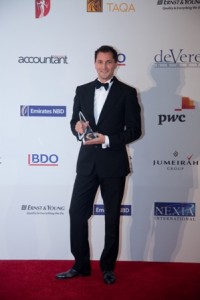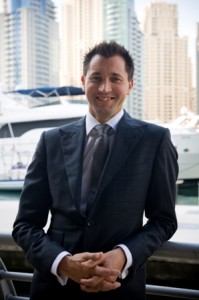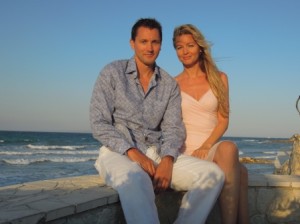For Chris Taylor, being declared the Middle East’s undisputed Chartered Accountant of the Year is a dream that has been several years in the making. After clinching the coveted honour at the ICAEW Accountancy and Finance Excellence Awards ceremony, the COO of Abu Dhabi Finance sat with Joyce Njeri for this revealing yet invigorating interview…

“I am not sure winning the award will encourage me to do anything differently in 2013, however I hope that it inspires all ADF staff to increase their efforts as it shows that even a relatively small company can achieve great things.”
Q.Firstly, congratulations on your win at the ICAEW Middle East Accountancy and Finance Awards. How did you feel when you were called out to accept the award when you were up against other top class chartered accountants?
A. To be honest my immediate reaction was surprise. Having seen the quality of the attendees and nominees at the event I was pretty sure that I was not going to win this time round. My surprise turned pretty quickly to concern as I knew Richard Dean, from Dubai Eye, was going to ask me some tough questions on accepting the award.
Did you know you were shortlisted for the award, or was it a surprise?
I knew I was shortlisted and I was already excited as I hoped to meet my all-time sports hero, Lord Sebastian Coe, at the event.
The competition for the coveted title was tough. What does winning the Chartered Accountant of the Year Award mean to you?
Winning the award means three things to me:
1. It is recognition for all of the hard work the staff at Abu Dhabi Finance have put into improving our business performance during 2012;
2. It made me very proud to be recognised by the ICAEW. I have been a member of the ICAEW since 1995 and have been extremely happy to see all of their efforts in enhancing the profile of Chartered Accountants in the Middle East in the last couple of years.
3. And finally, I’m happy that I had paid my annual subscription for this year, on time.
Going back in time now, share with us why you entered the award in the first place and what you were hoping to achieve.
We entered for the award because we are so proud of everything we have achieved at ADF during 2012, including – improved business performance, excellent customer service, rigorous risk management, and smooth internal processes – that we wanted to share our achievements with the wider business community. The ICAEW awards seemed an excellent opportunity to do that.
The following day when you went back to Abu Dhabi, how did you share the news with your colleagues? And how did you as a team celebrate?
At ADF we hold a weekly ‘huddle’, linking our offices via video conference, where we celebrate our successes and share our areas of focus and our challenges for the week ahead. I find it a very effective tool to ensure members of staff are recognised for their efforts and we stay on track in terms of the company and individual objectives. I am pretty sure that the ADF Head of Finance had posted the news on various social networking sites before the end of the evening though. We celebrated with a team lunch.
Now that you have been declared the Chartered Accountant of the Year, what would you do differently in 2013? How would you describe your mission in the profession?
I am not sure winning the award will encourage me to do anything differently in 2013, however I hope that it inspires all ADF staff to increase their efforts as it shows that even a relatively small company can achieve great things. The values which the ICAEW enshrines – particularly around transparency and integrity – are values which are at the core of the ADF customer service offering and I therefore hope the awareness encourages us to continue to act as a catalyst in the banking and financial services sector in the UAE. I believe my mission is the same as any other member of the ICAEW – to always act with integrity and transparency and to use your skills to improve the business performance of whichever organisation you work with.
Who has been your mentor throughout your career?
I have had different mentors in my professional career. I started my career with Deloitte in the UK where I was lucky enough to have three mentors during my time there – Steve Wilkinson, Les Platt and Sharon Thorne. All three were completely different characters. I learnt so much in my six years there which have helped me in my career to date. The breadth of opportunity offered to me at the firm, along with the excellent training and practical experience really put me in a great position to have a successful career in Financial Services.
As the Chief Operating Officer of Abu Dhabi Finance what does your work entail?
My role is very broad – which is one of the things I love about it. I have responsibility for Finance, Risk Management, Client Care and Quality Assurance, Human Resources, Operations, IT and Change Management. Therefore each day can include staff development issues, client service improvements, Information Security updates, financial performance reviews, product enhancements among others. Overall though, I see my role as one of strategic leadership, as I see it, the fundamental role of the COO is to provide support to the Board and CEO to ensure that the strategic vision and mission of ADF is successfully implemented and accomplished.
What are the best and worst things about your job?
The best things about my job are the people I work with and the breadth of the role. From working with the ADF Board of Directors on strategy and governance, through to mentoring our talented Emirati staff, to ensure they are developing along the lines of their career development plans, no day is ever the same. The most challenging part of the role is the same as most executives – finding the right work/life balance and ensuring enough time in the working day is spent on strategic issues and forward planning as opposed to fire fighting.
Please share with us your key career moments in the journey to becoming a Chartered Accountant.
Well I took an interesting path to becoming a Chartered Accountant. I really wanted to emulate Sebastian Coe and become an Olympic 800 metre champion but a combination of injuries and lack of talent made me realise I had to choose a more ‘sensible’ occupation. I actually studied Geography as my undergraduate degree, where I specialised in the geographical distribution of crime. Perhaps more relevant than I thought, given some of the high profile accounting frauds we have witnessed in the corporate world in the last few years. During the career fairs at Liverpool University I was really impressed by the presentations made by the ‘Big 4’ Accounting Firms and in particular Deloitte. The quality of the accounting trainees and managers presenting at the event (including Sharon, who later became one of my mentors) persuaded me that three years of training to become a Chartered Accountant seemed a good investment.
I had always been pretty comfortable with numbers and economics and thought I would be a natural fit. Mind you, the first two weeks of intense book-keeping training which I went through did make me have one or two moments where I reconsidered my decision. Nonetheless I am pleased to say I achieved 1st time passes in all of my exams and in 1998 qualified as a Chartered Accountant.
In total I spent six great years at Deloitte – working in the Assurance, Management Consulting, and Corporate Finance departments. I was even lucky enough to be seconded to the head office in New York for three months where I worked on developing the Deloitte audit methodologies, with a focus on value-added auditing.
On the same issue, the role of accountants has broadened. Now it’s not only confined to technical, but also advisory and corporate strategy. Can you share with us about these changing roles in today’s globalised world?
I agree that the role of the accountant has changed from ‘book-keeper’ to ‘strategic advisor’, although I think that most professions have found expectations increasing in recent years. It is a great honour and challenge and I think it makes the profession and a career in Finance a very promising proposition.
I think the ICAEW is doing a great job of providing support to chartered accountants across the globe in balancing this new role. It is important though for accountants to be very clear in what their role is within an organisation and ensure an appropriate balance is in place so that they can achieve all of the goals laid out for them.
In other words there is no point being a great strategic advisor to the company if the basics in terms of management information, accounting and financial reporting and regulatory filings are not in place. Therefore my message would be… ensure you get the basics right and then look to adding value through the strategic advisor role.
I also have to mention that the operational challenges faced by the accountancy profession have increased in recent years. Complicated products, increasing layers of regulation and reporting requirements, probably down-sizing in terms of finance functions resources, increasingly international operations, increased levels of disclosure and heightened levels of analysis of financial information by regulators, investors, regulators, and media have all served to increase pressure on getting the numbers right in a quicker time than ever before.
Organisations are becoming more and more complicated and diverse in their operations and finance teams need to work hard to stay ahead of the curve. For me one of the biggest challenges is meeting the basic accounting and reporting requirements whilst at the same time ensuring the Finance team is able to provide value added proactive business advice.

CORPORATE TITBIT:
Common values and goals are what drives a team’s performance and helps to ensure they work together to support the company in achieving its aims.
What advice would you give to your peers in terms of minimising reporting mistakes?
Reporting mistakes can cause a lot of damage to an organisation – it can lead to the wrong decisions being made and also reputations damage. Therefore it’s imperative that you;
* Ensure your financial accounting and reporting systems are rock solid and fit for purpose. Many functions still rely on manual workarounds to cope with their everyday reporting requirements. At ADF, for example, I am very proud to say we have implemented a fully automated IFRS compliant Oracle solution for our entire product range. Our financial reporting system interfaces with our Lending system to produce IFRS compliant reporting with no need for manual intervention. We close our books on Day 2 after month end and were recognised by Banker Middle East Industry Awards for Best Use of Technology for this implementation in 2011.
* Ensure you understand the bigger picture – if you don’t have an indepth understanding of your products, your market and the economic picture then you will find it difficult to really ensure that your financial reporting is accurate.
* Budget – be rigorous in your budget process. This will act as your sense check when comparing actual results to budget. If your budget process is weak then your benchmark is poor, making it that much harder to spot any errors.
* Quality staff and systems – invest heavily in hiring and developing the best team you can afford.
* Review time – set aside enough quality review time to ensure that any significant mistakes can be spotted and rectified before publication.
As a top Chartered Accountant how much demand do you foresee for qualified accountants in the Middle East region in five years time? For instance, what particular skills will be most in demand? And how will businesses in the region change in five years as a result of the global economic downturn?
I hope that demand increases for Chartered Accountants in the Middle East over the next five years. The economic performance of the region is improving along with an increase in regulatory reform, transparency and governance requirements which should mean well qualified accountants are in demand.
Companies and government will be looking to well qualified candidates with international experience who can add value to their organisations. Businesses in the region have already changed as a result of the downturn. Firstly they are shifting their focus from West to East as it becomes clear that the Asian economies are likely to outperform Europe in the future. Secondly there is a greater level of understanding at a Board level of the importance of effective financial risk management and associated governance standards.
Accountants who have experience of international markets, who have managed through a downturn should be well placed in the job market.
What is most important to you as an accountant when it comes to building a successful accounting team in your organisation?
For me it does not matter what kind of team you are trying to build – HR, accounting, business development and the like. The most important thing is that the team shares a common set of values and is clear about the objectives of the organisation and their own team.
Common values and common goals are what drives a team’s performance and helps to ensure they work together to support the company in achieving its aims. At ADF we have four very clearly stated values – One Team, One Goal; Continuous Improvement; Valuing our Community; and Passion for Our Clients. We have a values recognition programme, and I talk about the values at every gathering of our company. We use a ‘Lite’ version of the Balanced Scorecard methodology to ensure everyone is clear about ADF’s overall objectives, and we cascade this company scorecard into individual goals. I am pleased to say that since introducing these concepts we have outperformed against budget and 2012 has been a record year for us in terms of business performance.
What are some of your favourite gadgets, apps, tools, and products – especially related to social media?
I like the Balanced Scorecard app in the iPad and also use an efficiency tool called ‘RescueTime Robot’ which helps me monitor where I spend my time. I think LinkedIn is a great networking resource and our HR team uses it heavily for recruiting. I try and keep up with trends using Twitter and stay in touch with old friends on Facebook.
How do you spend your free time? What are your sporting interests, if any?
I love competitive sports – I used to compete at a pretty high level in Middle Distance running and since moving to the UAE, have taken up Triathlon. I competed in the Abu Dhabi Triathlon for the last couple of years. I enjoy the social element of the training and the competitive nature of the sport. I also enjoy watersports, tennis, travelling with my wife Tunde and swimming with my daughters, Catrin and Maddie. We had an amazing adventure in Sri Lanka earlier in 2012 and I would really recommend a trip there to anyone – it is an amazing and friendly country.













